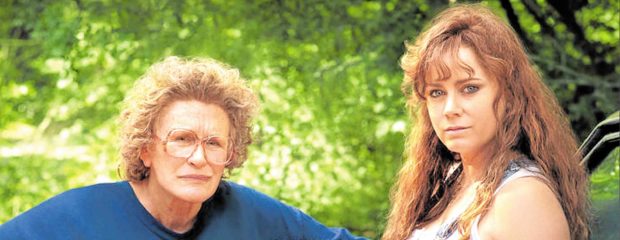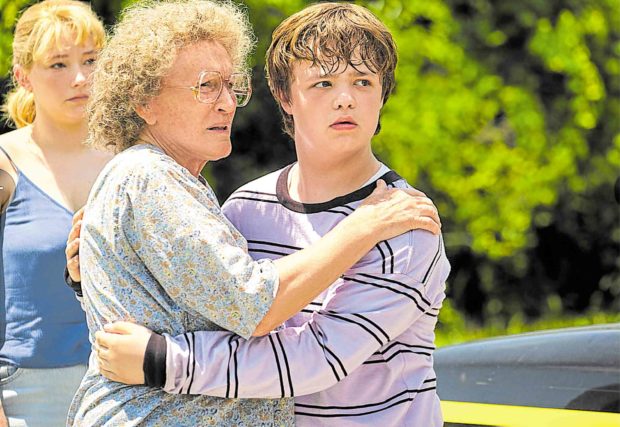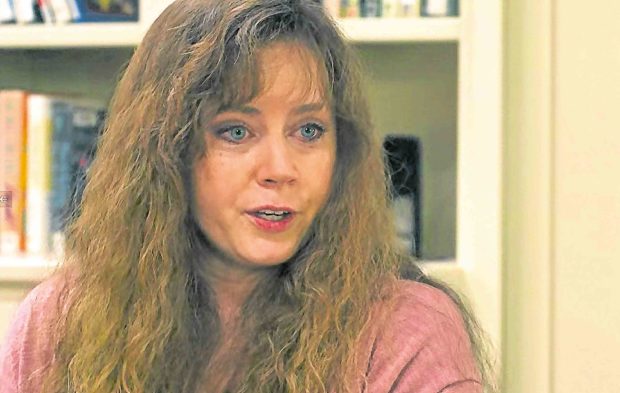Glenn Close and Amy Adams on playing real-life characters in ‘Hillbilly Elegy,’ and their lockdown realizations
We wouldn’t be surprised if Glenn Close and Amy Adams will once again find themselves at front and center in next year’s awards derby, this time courtesy of Ron Howard’s “Hillbilly Elegy,” which began streaming on Netflix yesterday.
After all, the 13 Oscar nominations they have racked up between them (Glenn has seven, Amy has six) are nothing to scoff at—and we’re more than willing to stick our neck out in support of their knockout performances in the real-life family drama.
While Amy’s thespic chops are as razor-sharp as they were in “Sharp Objects,” Glenn delivers another stunning vanishing act that recalls the spellbinding “screen magic” she had conjured up in projects like “Albert Nobbs.”
“Hillbilly Elegy,” based on JD Vance’s best-selling 2016 memoir, is about Yale student JD (Gabriel Basso) who’s forced to reflect on his cash-strapped, character-forming roots in hillbilly communities after he gets an urgent phone call about an emergency involving his once-brilliant but perpetually troubled mom Beverly (Amy Adams).
JD and Bev’s individual journeys are strongly anchored on the nurturing ability of the doting but tough-talking family matriarch, Mamaw (Glenn).
The film, which plays out like a Filipino drama about a dysfunctional working-class family grappling with contentious issues, examines generational trauma and the time-honed values that keep its members together.
So, you can imagine how thrilled we were when we spoke to Amy and Glenn in a Zoom video interview with the Asian press last week to discuss their first project together, under the helm of Ron Howard (“A Beautiful Mind,” “Apollo 13,” “Frost/Nixon”).
It’s hard not to get blown away by the physical and emotional transformation Glenn goes through because you feel the carefully limned restraint she utilizes to keep Mamaw’s gruff and foul-mouthed exterior in check—from the facial transfiguration to the posture and gait that help convey her character’s distinctive traits.
“When we started [the shoot], I didn’t want to be distracted by my face,” Glenn explained when we asked her to talk about how she came up with Mamaw’s physicality. “I wanted to change my face in very subtle ways that wouldn’t make people go, ‘Oh, that’s just Glenn Close with a crazy wig on.’
“So, I went to the people who were my collaborators in ‘Albert Nobbs’ (about a woman who poses as a man to be able to work as a butler at an elegant hotel in 19th century Ireland). I asked Martial Corneville and Matthew W. Mungle to help me with the hair and makeup, apply a few changes to my nose and ears after going over the black-and-white portrait we had of Mamaw—that was our template. So, there came a point when I looked up and said, ‘Ah, there she is … I don’t see myself anymore. Now, I can just take off from here.’
“But it was also helpful to ask very specific questions to the family, who visited the set, and see Mamaw in videos—observe her energy in motion and how she related to people. I asked them questions about how she walked, smoked cigarettes, how she sat, and what she wore [when she was still around]. So, the Mamaw you see in the film is the Mamaw that I got to know from her family.
“Then, there’s you as an artist. You instinctively make the role your own somehow. It was a thrilling journey for me to find the essence of this remarkable woman!
“Like any family, theirs didn’t always get along. I mean, all the great dramas ever written were based on stories of families. They have good and bad times, and they come around. The fact that we were attempting a story about a family made me feel like I was right at the heart of what it means to be human. What makes this story even more inspiring is the fact that JD did stop the cycle of generational trauma that his family had been in the clutches of.”
Amy’s challenge was just as daunting.
“The most challenging part of it for me was that, Beverly is alive and doing well,” Amy pointed out, noting that Bev is now on her sixth year of sobriety. “But I also wanted to tell her story with a lot of humanity and empathy in a way that honestly reflected that period of her life.
“I wanted to show how smart she is as a woman (she graduated valedictorian in high school). She put herself through nursing school, was a single mother on and off for a lot of the time. I wanted to tell her part in the generational cycle that existed [in her family]. So, there was a lot to undertake, and it was very rewarding.
“It wasn’t really the first time that I’ve played a real person. In the course of research, some of them are more enthusiastic than others (laughs). But Bev was amazingly generous, and while I was very intimidated [by the prospect of portraying her], I also wanted her to understand that she could trust me with her story.
“It’s a tale that has many sides—there’s JD’s, there’s the book, the script, etc. There are a lot of steps between what her perception is and what will be seen onscreen. And she was really open to the idea of sharing her experience with us! But I will say that sometimes it’s really helpful to have the real person [guide you], because it gives you a sense of responsibility.
“Another thing that attracted me to it was [the issue about] generational trauma. How do you break the cycle? And how do you move past your upbringing and still stay rooted in your family? I come from a big family, so that’s something that I constantly [mull over].”
Here’s the Q&A with Glenn and Amy:
Can this story and its characters help viewers better understand America today? What are the insights you guys got from doing this?
Glenn Close (GC): Yes, it can. Any story that is very specific about what families go through in certain areas of this country [the United States] can only be good when people take the time to actually listen to what the characters are saying. If we did that more, we would probably be in a different place than we are now.
One of the things that art does is to tell stories. Everybody has a story and each of them counts. You do it to have personal fulfillment, but you also do it because you think it’s something important—and I did feel that it was an important story to tell.
Amy Adams (AA): Ditto (laughs). I’ve been doing that this whole time [during the interviews] because Glenn is so articulate. One of the things that I find so compelling is the strength of the women inside of the story, be it the mother, the sister Lindsay (Haley Bennett), and how that helps shape JD. I do think there’s something to be found in understanding these characters.
You both deliver great performances here. There’s already buzz about this for the upcoming awards season. Although you’ve both been down this road many times before, what does it mean for you to be recognized?
GC: It means a lot. Frankly, I think we’re in a very difficult profession. Hopefully, we should only get better as we get older. But I have to say that the thing that means the most to me is when our peers choose our performances as being worthy of attention.
AA: Yeah, ditto (laughs). It’s a very meaningful thing to be recognized. In any given year, there are so many wonderful performances, and I just feel lucky to be a part of the stories that are resonating with people. That’s a very fortunate position to be in—and I’m very grateful for that.
You’re working with each other for the first time. Did you have an insight into what makes the other person tick?
GC: I went into this project having deep respect for Amy’s talent. I’d met her on red carpets, but we didn’t ever spend any time together [even if] we sat next to each other. But when you work with a person, you get a sense of the respect she has for the people she’s collaborating with—and that means the most to me because, as actors, we learn from the process of making something together.
If you’re with an actor like Amy, or a director like Ron Howard, you have the best of the best. So, that process of collaboration is vital and thrilling. And that’s what feeds my soul. Working with Ron and Amy is one of the best experiences of my career.
AA: Working with Glenn is a dream! If I could bottle Glenn’s “special sauce,” that would be awesome (laughs)! But one thing that I love about Glenn is that she still has so much passion for the work that we do. And it was really contagious, because it can sometimes be quite a fearful thing for me. But seeing the joy and the fun that she brought to it on top of her amazing talent and work ethic was truly inspiring.
It has been a strange year. How did you spend the lockdown period, and what did you discover about yourself? Did you get frustrated about not being able to work in the usual way? GC: Well, I moved across the country, permanently. Just before almost a year from now, pre-COVID, I wanted to be closer to my family. Then, the pandemic hit. I went to California for something, then came to New York for another—and so, I’ve been here since February.
You try to stay creative, but I haven’t achieved all the things I wanted to in this very rare time of having to be home. I did realize that I don’t go to bed without the dishes being washed … it’s like I can concentrate on order and cleanliness in my house and make my bed every day (laughs). But it has been hard on my brain because it doesn’t quite know what else to do. Being home used to be temporary for me [because I work all the time]. Now, when I think of starting up again, that will be a challenge, as well.
And here’s how I feel about this: Christopher Walken once said that when he isn’t working, he feels like a fighter in the corner … sitting on a stool. [As for me,] I’d say that I feel like a Ferrari in the garage—and I was in the garage a lot (laughs)!
AA: At first, I was with my daughter transitioning into online schooling—that was how we spent the first couple months of the lockdown. For me, it was trying to figure out fourth-grade fractions, then me understanding that I needed to leave the math to her teacher (laughs). Initially, that was the big challenge for me.
Then, I realized that I’m pretty good at doing nothing, and my husband says I have two speeds—which is on and [more often] off. I set a bunch of goals, like I wanted to practice guitar and do all these other things, but I ended up not doing any of them! I did cook a lot, though.
GC: That makes me feel so much better (laughs)!
AA: And I’m much more social on Zoom than I’ve ever been in person. I tend to be very socially shy—I’m more of an introvert in big groups. But when it was something that had to be done online, I was suddenly the life of the party (laughs)!
I was hosting a moms’ Zoom group, where we all get to talk about our week and our challenges. Then, there’s a Zoom movie club that I became a member of. Suddenly, I have this very active life online. Yeah, I think people have caught on to me (laughs). INQ


